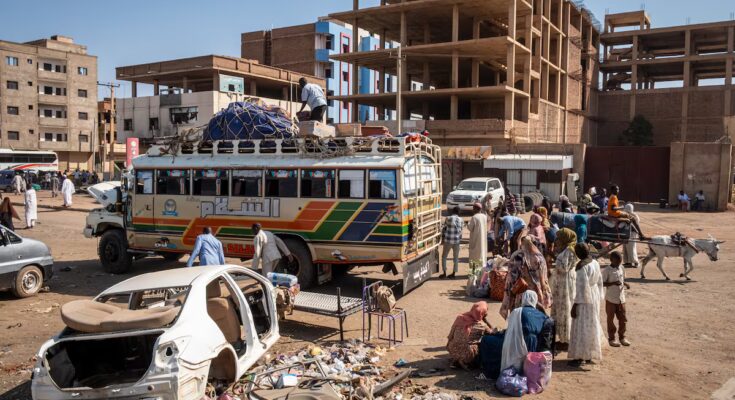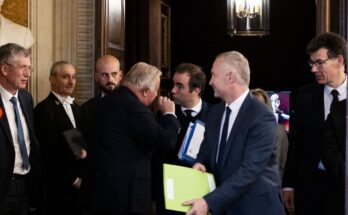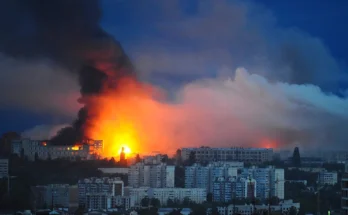Those arriving in Khartoum via Madani Street in the south-east can easily see the devastation that almost two years of civil war have left in Sudan. The front line passed through the capital and the city today is a shadow of the metropolis of the past. Iconic office towers and luxury hotels have been reduced to ruins and in the streets, where there are no intact buildings, there are many reminders of months and months of fighting: charred cars, walls riddled with holes, broken suitcases and a patchwork of bullet fragments and shell casings.
When war broke out in April 2023, millions of people fled. The conflict between Abdelfah al Burhan’s government army (SAF) and the Rapid Support Forces (RSF), Mohamed Hamdan Dagalo’s paramilitary group, has thrown the country into the abyss. According to the United Nations, the conflict has already displaced nearly 12 million people and caused the worst humanitarian crisis in decades. While there is no consolidated count, the war is estimated to have resulted in hundreds of thousands of deaths.
Iconic office towers and luxury hotels have been reduced to ruins and in the streets, where there are no buildings intact, there are many reminders of months and months of fighting.
The government army succeeded in expelling the RSF from Khartoum this spring and the executive, which moved to Port Sudan after the war began, is now encouraging civilians to return and join the reconstruction. One million people have already returned to the capital, in the heart of which 2.5 million citizens lived before the war. In Khartoum and its metropolitan area the number of inhabitants exceeded six million in 2023.
Reconstruction of the official buildings began, and the international airport reopened in mid-October with a celebration. The celebration, however, was short: that same day, the RSF launched kamikaze drones over Khartoum and forced the closure of the terminal. On November 7 they bombed the city again.
Recent drone attacks indicate that Khartoum could be dragged back into war at any time. Many of the civilians who have returned to the capital fear the paramilitaries will return, especially after the RSF took the western town of El Fasher in late October. “They are children,” says Khalil Hariri, a 55-year-old security guard, referring to the RSF fighters he saw on the streets of Khartoum. “They are nothing but children,” he repeats.
Hariri, a tall, soft-spoken man, guards the remains of a looted bank with a companion. He sits on what remains of an office chair, dragged under a destroyed shed next to some household appliances. It was where bank executives parked their SUVs. It says paramilitaries barricaded themselves in office buildings and shopping malls, armed with rifles and grenades, and fired sniper rifles from rooftops. “They opened fire on civilians,” Hariri says in a low voice. “Some were persecuted, others were lethargic due to drugs,” he adds.
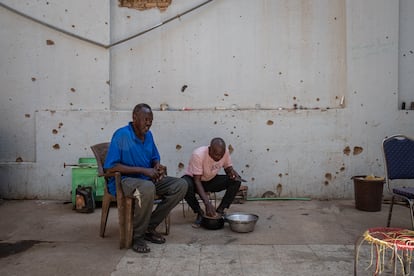
Both the RSF and the army have been accused of killing civilians, but international investigators mainly blame the large-scale massacres on paramilitary forces. In the Darfur region there are fears that a genocide against non-Arab populations is underway.
Hariri recalls the attack on his colleague Mohamed, who was tied hand and foot before being murdered. Behind him, his partner, Yousif Abdul, fries an onion on a makeshift stove. When Hariri tells what happened to Mohamed, his eyes water.
“Mohamed continued to pray out loud,” says Hariri, moved. “He feared for his life. A soldier shouted: ‘Why are you praying to Allah? Do you think we are not Muslims?’ He continued to pray. The soldier shot him twice in the back of the head at point blank range.”
“People lived here”
A few blocks away, Nafisa Souleyman, 55, serves sweetened tea in two shot glasses. “This was one of the busiest streets in the center,” explains the woman. The Greek owners of the Acropole Hotel, the oldest in Khartoum, located on nearby Babiker Badri Street, brought their guests to their tea stall. “Now almost no one comes to my corner.”
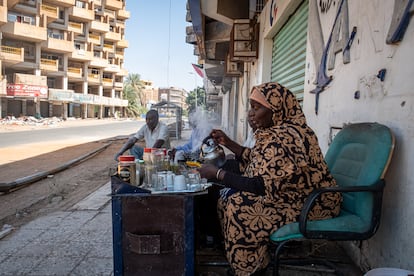
There are some customers around him; They are all security guards who, like Hariri, are paid to ensure that buildings are not looted any more than they already have been. A man, who prefers to remain anonymous, says there are still people who come to the dilapidated buildings to steal air conditioners or copper cables. “Some are wearing military uniforms,” he whispers.
They opened fire on civilians. Some were persecuted, others were lethargic due to drugs
Hariri
Souleyman pours another cup of tea. From his position you can see dozens of buildings marked by fighting: perforated facades, entire floors with holes opened by rockets and grenades. “People used to live here. But when the fighting started, everyone fled,” he says laconically, pointing to a house with multiple holes in the facade.
He turns towards what remains of a sign that belonged to the company that occupied the building in front of which he sits, and carefully picks up a Sudanese passport that someone left there and which he decides to keep. When you open your passport to the personal information page, a photo of a little boy with shaggy black hair appears. “He was born in 2022,” he says, shaking his head: “I don’t know him, but if his family returns to rebuild the city, I will give them his son’s passport.” She sighs, closes her eyes, and whispers, “I hope he’s still alive.”
